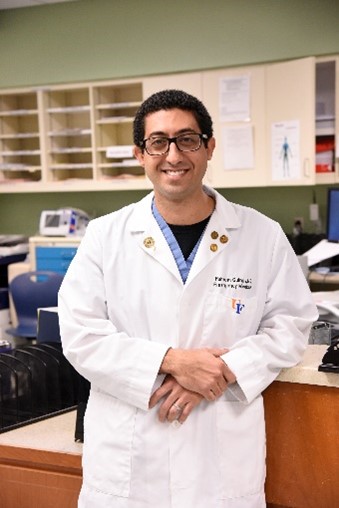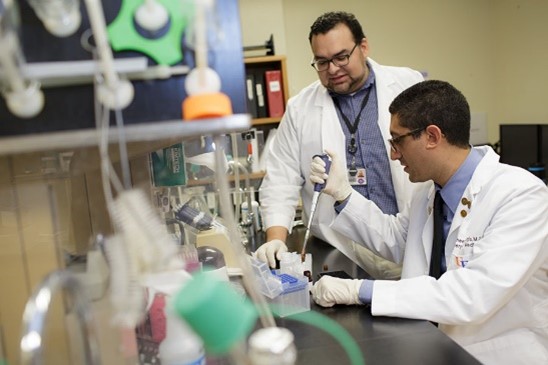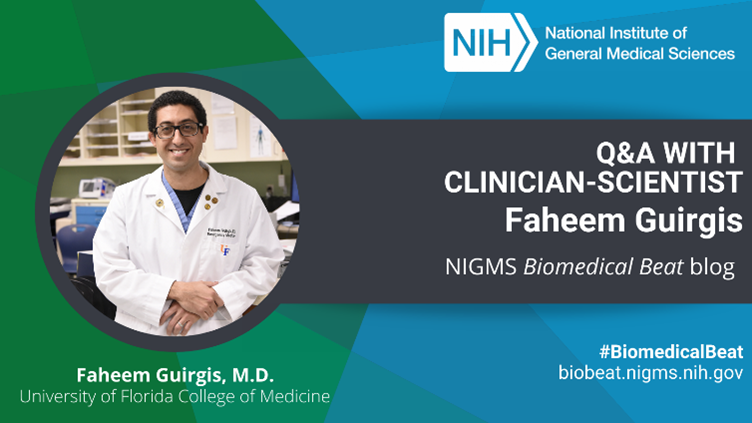
“Patients at urban and inner-city hospitals are in dire need of high-quality care and frequently don’t have access to clinician-scientists doing cutting-edge research. That’s part of what has made me committed to performing research in these settings,” says Faheem Guirgis, M.D., an associate professor of emergency medicine at the University of Florida College of Medicine, Jacksonville. Check out the highlights of our interview with Dr. Guirgis below to learn how he became a doctor and what inspired him to conduct research on sepsis.
Q: How did you become interested in science and medicine?
A: After the phase of wanting to be a firefighter or police officer, the next thing I remember wanting to be was a doctor. My father was and is my ultimate inspiration for pursuing a career in medicine. He was a family-practice physician committed to providing the best care possible for his patients before retiring recently, and they loved him.
Q: What was your path to becoming a doctor?
A: I majored in microbiology and immunology as an undergrad at the University of Miami, earned my medical degree from the Chicago Medical School at Rosalind Franklin University, and completed my emergency medicine residency through the Albert Einstein College of Medicine. I chose emergency medicine when I realized how much I loved resuscitation, which is providing care to the most critically ill patients in the early minutes and hours of their condition.
Q: How did you become interested in sepsis?
A: I’ve always been one of those people who has to work on the hardest thing, and sepsis is a huge challenge because it’s so complicated. Also, I’ve been fascinated by infectious disease work since I was an undergrad, and sepsis work is like infectious disease and resuscitation mixed together—it combines two things I’m passionate about.
Q: When did you realize that you wanted to do research, as well as take care of patients?

A: I think that came with my job at the University of Florida, Jacksonville. As I started to do the kinds of things that I wanted to do clinically, all these scientific questions started to arise in my mind. In 2011, about a year after becoming a faculty member, I wrote my first research grant application. I didn’t have any formal research experience before that, and my proposed research was entirely driven by my clinical experience.
Q: What are you researching now?
A: My group is studying how the body’s lipids may play a role in sepsis. Lipids have protective effects that should help combat infection. But our work has shown that in sepsis, some of the regulatory mechanisms don’t function as they should, and they can actually be harmful. We focus not only on understanding lipid and lipoprotein function and dysregulation, but also on looking for potential roles for lipids in predicting the outcomes of sepsis or treating it.
Q: What do you consider your biggest accomplishment so far?
A: Getting my K23 grant—funding to do patient-oriented research with mentorship and career development components—from NIGMS was a huge accomplishment for me. It took years of hard work and trying to figure out what was needed to develop a successful application. Now, I use that experience to teach others how to develop K grant applications. Getting my independent research grant was my next huge accomplishment and has been very exciting. I’m also proud of a paper we recently published about a subgroup of sepsis patients who have lower lipid levels and tend to have more severe disease and poor outcomes. We’re hoping to do more studies on this subgroup to understand the mechanisms that might cause poor outcomes and see if the subgroup will respond differently to specific sepsis treatments.
Q: What advice would you give to students interested in pursuing a career in science or medicine?
A: Follow your heart to accomplish your goals, and don’t give up. Seek out mentors who are selflessly committed to your success, meet with them often, and follow their advice. When it comes to patient care, remember that patients really value every minute you spend with them, so try to give them your best.
Dr. Guirgis’ research is supported by NIGMS grant R01GM133815.



Good and benefit